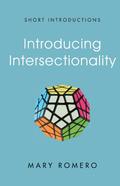Introducing Intersectionality
Polity Short Introductions

1. Edition November 2017
200 Pages, Softcover
Wiley & Sons Ltd
Short Description
How can we hope to understand social inequality without considering race, class, and gender in tandem? How do they interact with other categories such as sexuality, citizenship, and ableism? How does an inclusive analysis of domination and privilege move us closer to solutions touching the lives of diverse populations?
In this clearly written book, Mary Romero presents intersectionality as a core facet of the sociological imagination. One-dimensional approaches are no longer acceptable. Instead, we must examine all systems of oppression simultaneously and how they integrate and work with or against each other to shape life experiences. Recognizing the dynamics of patriarchy, capitalism, and white supremacy, Romero shows how social inequality is maintained or minimized in various social settings and everyday sites of interaction. Drawing the theoretical threads together, the book demonstrates intersectional approaches in action in relation to the care crisis and wealth divide, to highlight the different understandings of these issues and their solutions arising from a comprehensive, intersectional examination.
Offering an overview of scholarly and activist tradition in the development of intersectionality and how to apply intersectionality as a lens to enrich our understandings of social life, this introductory text will be an invaluable and welcome resource for all students of sociology.
How can we hope to understand social inequality without considering race, class, and gender in tandem? How do they interact with other categories such as sexuality, citizenship, and ableism? How does an inclusive analysis of domination and privilege move us closer to solutions touching the lives of diverse populations?
In this clearly written book, Mary Romero presents intersectionality as a core facet of the sociological imagination. One-dimensional approaches are no longer acceptable. Instead, we must examine all systems of oppression simultaneously and how they integrate and work with or against each other to shape life experiences. Recognizing the dynamics of patriarchy, capitalism, and white supremacy, Romero shows how social inequality is maintained or minimized in various social settings and everyday sites of interaction. Drawing the theoretical threads together, the book demonstrates intersectional approaches in action in relation to the care crisis and wealth divide, to highlight the different understandings of these issues and their solutions arising from a comprehensive, intersectional examination.
Offering an overview of scholarly and activist tradition in the development of intersectionality and how to apply intersectionality as a lens to enrich our understandings of social life, this introductory text will be an invaluable and welcome resource for all students of sociology.
* 1. Identifying Intersectionality
* 2. Where Does Intersectionality Come From?
* 3. Intersectionality in Everyday Campus Life
* 4. Intersectionality and Social Identities: Examining Gender
* 5. Exploring Interlocking Systems of Oppression and Privilege
* 6. Intersectional Approaches to Social Issues: The Wealth Gap, the Care Crisis, and Black Lives Matter
* Conclusion: Intersectionality and Social Justice
Lynn Weber, University of South Carolina
"This lucid, jargon-free, and impressively comprehensive book by a leading scholar in the field is ideal for undergraduate courses on a wide range of topics, but it is so much more than that. It is vital reading, showing how inequality can be found in our own backyard and not just 'out there.' It is something, in other words, that we all can - and must - do something about."
Leslie McCall, Graduate Center, City University of New York


